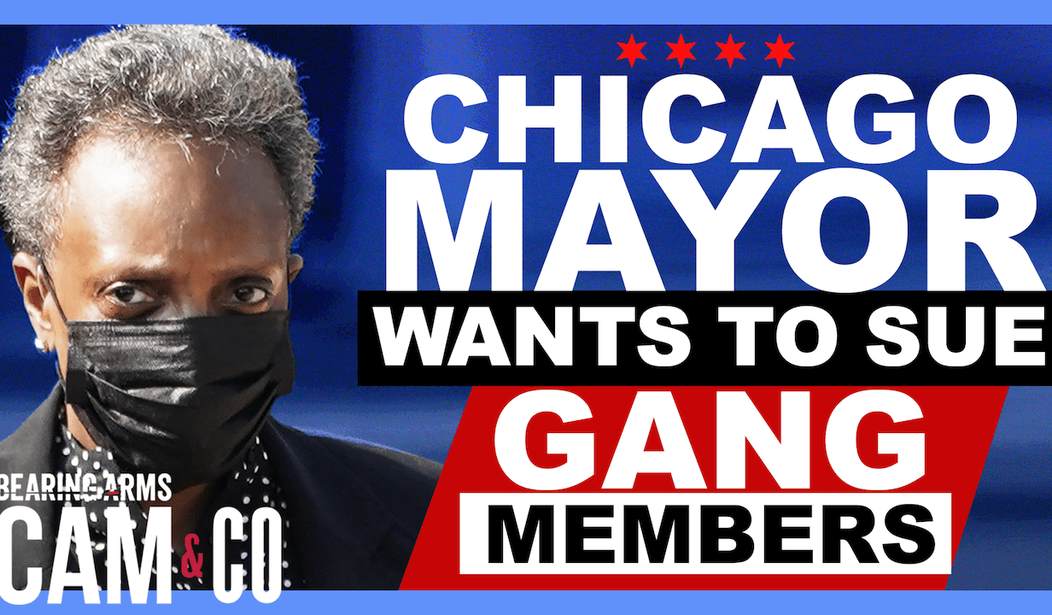On the one hand, I suppose gun owners should be grateful that Lori Lightfoot is talking about holding gang members and not law-abiding gun owners responsible for Chicago’s violence. On the other hand, the mayor’s plan to sue gang members in civil court in an attempt to seize their assets suffers from some serious flaws, and appears designed more to make the mayor look like she’s doing something to address the flood of violence on city streets than to actually make a difference.
We’re taking a closer look at Lightfoot’s proposal on today’s Bearing Arms’ Cam & Co, but we’re not the only ones scrutinizing the mayor’s big idea. In fact, some local politicians and the Illinois chapter of the ACLU are already weighing in, and they’re less than impressed.
The American Civil Liberties Union of Illinois is preparing a legal analysis of the ordinance and urged City Council to be cautious when considering it. ACLU of Illinois Spokesman Ed Yohnka criticized the strategy and said the well-publicized inaccuracies of the gang database means the city risks suing the wrong people, and there already are laws to confiscate property from people involved in crime.
“One thing should be clear — civil asset forfeiture is not the vehicle for reducing gun violence in the city,” Yohnka said in a statement. “Reducing violence in all Chicago’s neighborhoods requires investing in communities, violence reduction programs, and expanding access to social and mental health services. The Mayor and Council should spend their time and energy on such efforts.”
… Ald. Andre Vasquez (40th) blasted the proposal and said by the ordinance’s logic, City Council could be defined as a gang.
“Looking at our city’s history of racist policy and racial profiling by police, a gang database that the Inspector General has made clear is inaccurate and compromised, all in the same week the city is being sued for stop and frisk practices, this is the wrong direction for the city to go in, and it doesn’t make us safer,” Vasquez said in a statement.
… Vasquez also said the “rushed” nature of the ordinance concerned him.
“It may garner a headline, but it doesn’t address the root cause,” he said.
No, it does not. But not only does Lightfoot’s proposed ordinance fail to address the root causes of crime, it fails to adequately address acts of violence and the individuals responsible for them. Why is the mayor so interested in bringing alleged gang members to civil court when so few suspects are arrested and charged with shootings in Chicago? The clearance rate for non-fatal shootings is less than 10% in Chicago, but rather than developing a strategy that will lead to more arrests and serious consequences for the city’s armed robbers, carjackers, muggers, and gang members, Lightfoot wants a local ordinance (one that mirrors an existing state law, no less) to seize the assets of suspected gang members.
Lightfoot defended the ordinance as “one tool” to protect Chicago residents “against these violent street gangs that have demonstrated over and over again, almost on a daily basis, that they have no respect for the sanctity of life, killing babies, killing children, killing old people indiscriminately, that is absolutely not acceptable.”
“What we are proposing is a tool in civil courts that gives us the opportunity to go after those gangs that are wreaking havoc, and in particular, take away the profit motive from them by seizing assets that they have been able to purchase because of their violent activity in our neighborhoods,” she said.
This is just downright idiotic. There is no profit motive for Chicago’s gangs to act violently. In fact, quite the opposite. The gangs that fuel and feed Chicago’s illicit drug market could be making more money if they were keeping a low profile and simply dealing instead of shooting each other over disputed territories and personal beefs. It’s one reason why the Mexican drug cartels that operate in the United States aren’t nearly as violent north of the border as they are on their home turf; it’s one thing to battle it out in an almost failed state with endemic corruption in law enforcement and the judiciary, but it’s something else entirely to attempt the same thing in a country that has a (mostly) functional criminal justice system, at least at the federal level.
If Lori Lightfoot wants Chicago’s gang members to stop shooting, she’s going to have to make them, and threatening to sue them for their assets isn’t going to do the trick. Yes, by all means the city should be engaged in proactive efforts to get high-risk individuals on the right path, but Chicago also needs to be better engaged in the kinds of policing strategies that will lead to more arrests and convictions for both non-fatal shootings and homicides.
About the only positive thing I can say about Lightfoot’s plan is that it isn’t aimed at responsible gun owners or out-of-state gun stores. That’s good, as far as it goes, but her big idea will still have as much of an impact on Chicago’s gang violence as Illinois’ FOID card requirement has: none at all. Chicago doesn’t need to reimagine policing so much as it needs to reject the politicians who are running things. It’s clear that the folks in charge are unwilling to take the steps that are desperately needed to bring some measure of peace to the city’s streets, and until that changes it’s hard to see how Chicago’s deadly wave of violence will ever truly recede.










Join the conversation as a VIP Member